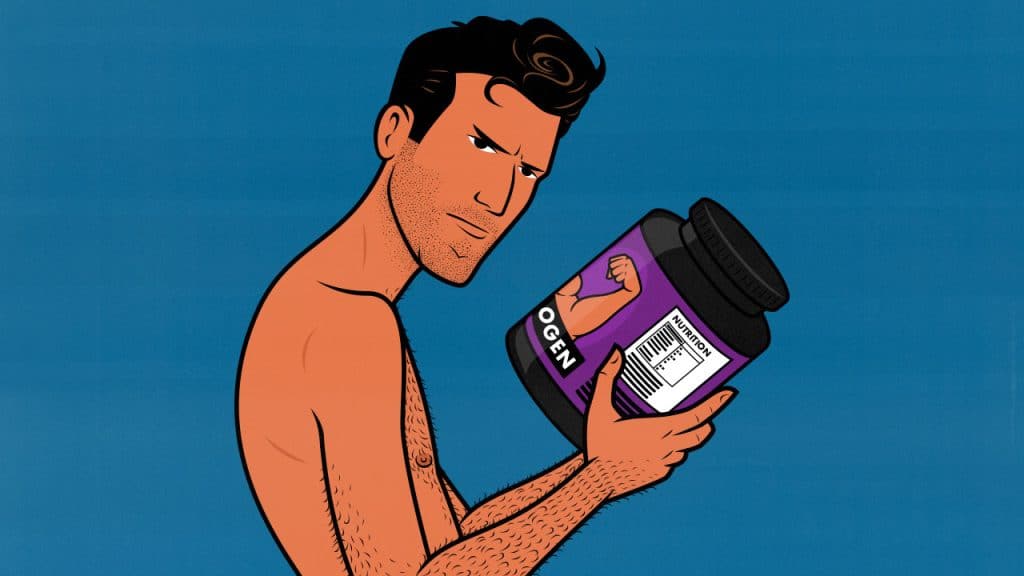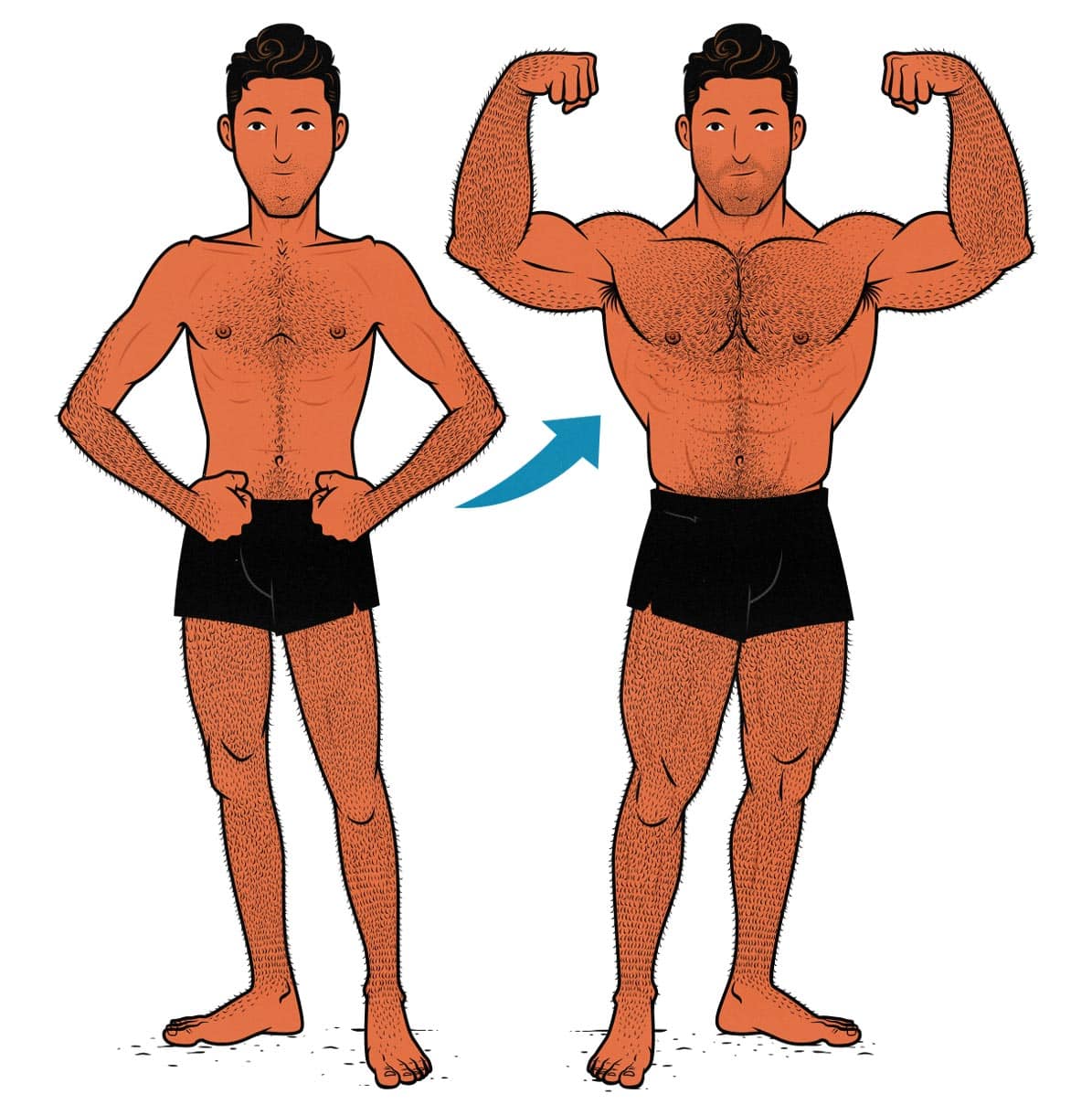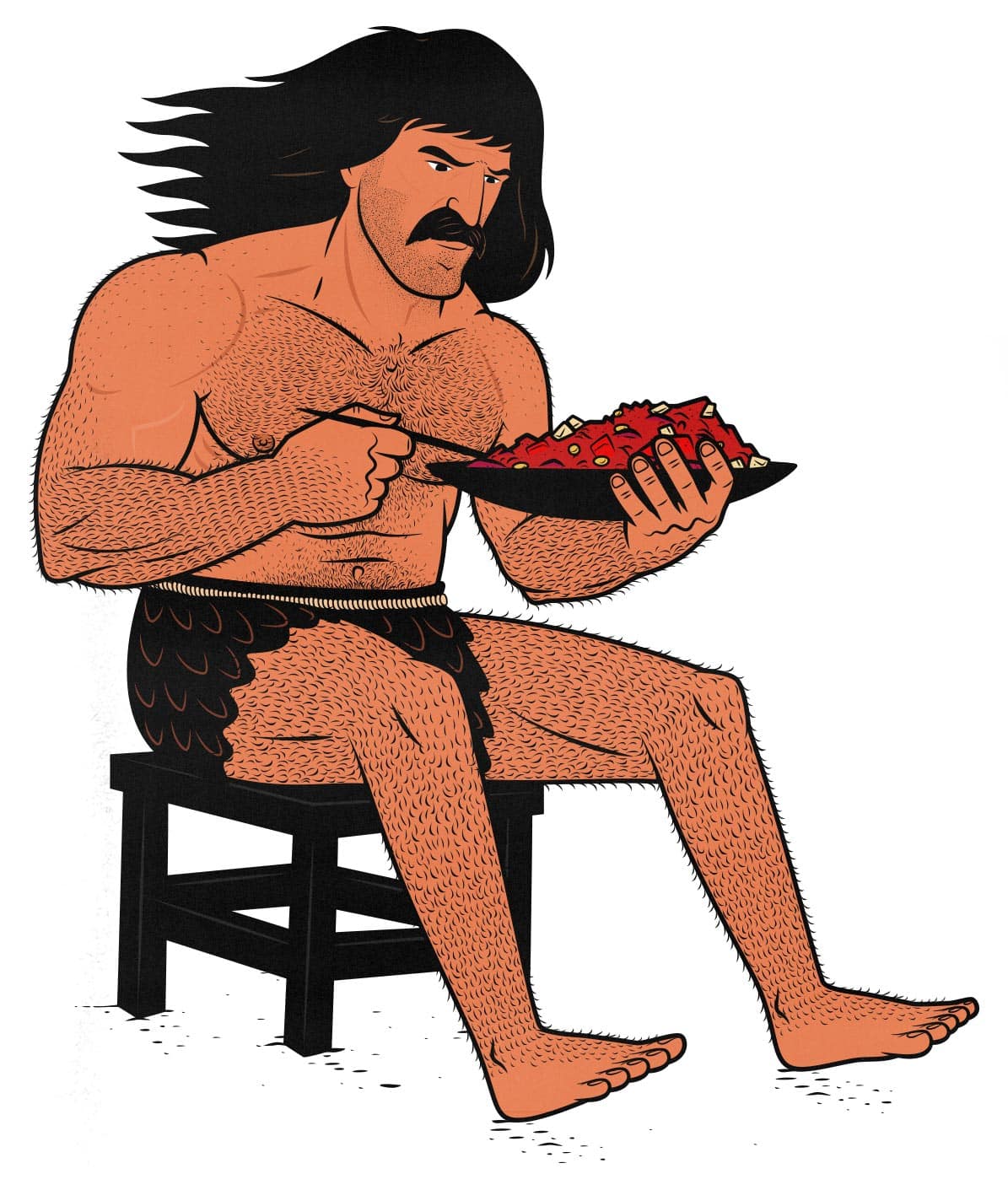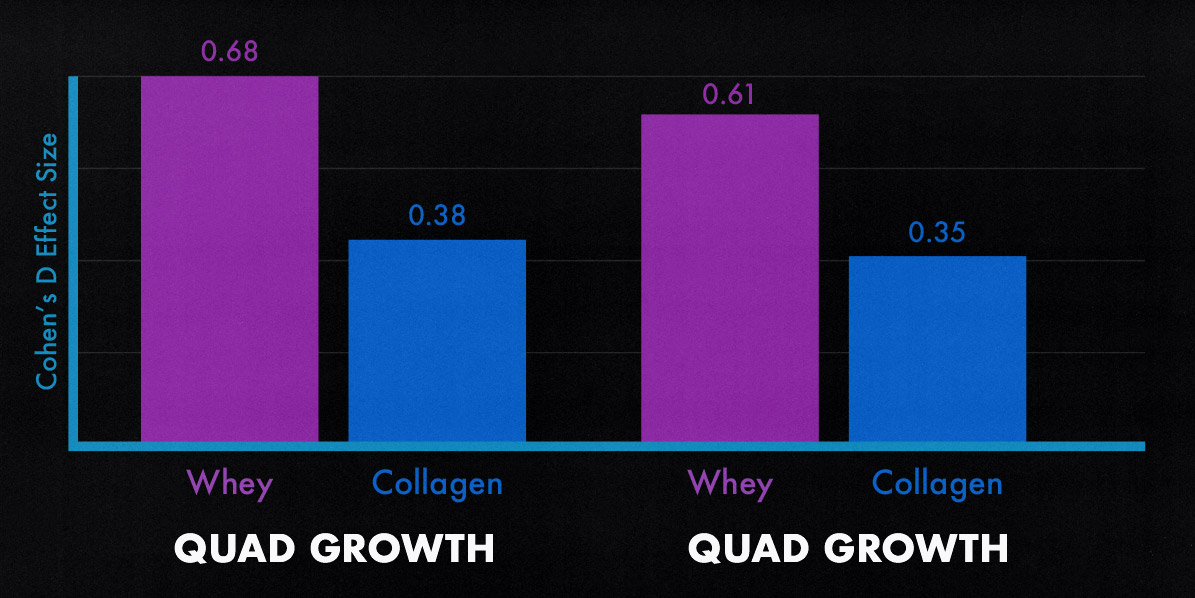
Does Collagen Help Build Muscle? A Quick Research Overview
Collagen is a popular “anti-aging” supplement for maintaining skin elasticity, keeping our joints strong, and helping our connective tissues recover. So far, the research has shown that collagen does indeed offer all of those benefits, in a small way—probably (study, study).
Lifters often run into nagging aches and pains in their joints and tendons. Supplementing with collagen seems like a reasonable way to improve recovery. That raises an obvious question: what about muscle growth? Does collagen help build muscle?
Jacinto and colleagues tried to answer that question by comparing whey protein against collagen protein, then seeing which yielded more muscle growth. It’s a neat study. Let’s delve into it.

What is Collagen?
Collagen is the most abundant protein in your body, providing structural integrity to your skin, hair, nails, bones, tendons, ligaments, cartilage, and blood vessels.
Since collage is found in connective tissues and skin, the natural way to include it in your diet would be to eat more connective tissues and skin, such as:
- Bone Broth: Made by boiling animal bones and connective tissue. The long cooking process breaks the collagen down into gelatin, which dissolves in the broth.
- Tough Cuts of Meat: Some cuts of meat, such as brisket and shank, are tough from all the connective tissue they contain. You can cook slow-cook or stew them, breaking the connective tissue down into collagen.
- Fish Skin: The skin and scales of fish are rich in collagen.
- Chicken Skin: Like fish, chicken skin is high in collagen, too.
- Organ Meats: Organ meats like the liver, heart, and kidneys contain a little collagen.
If you want to add even more collagen to your diet, you could cook with gelatin or supplement with collagen. Collagen supplements are made by breaking collagen down into peptides via hydrolysis, giving it the names “collagen peptides” and “hydrolyzed collagen.” Both are the same. You can use either one.

Collagen is A Strange Protein
Collagen has a unique amino acid profile. On one hand, the presence of glycine, proline, hydroxyproline, and hydroxylysine makes it good for collagen synthesis, which can improve the health of bones, tendons, and other connective tissues.
On the other hand, collagen is low in leucine, isoleucine, valine, lysine, and methionine, which are key amino acids for muscle-protein synthesis. As a result, you’d expect collagen to be good for your body but bad for building muscle.
However, our bodies are fairly flexible. We can build muscle remarkably well even when consuming “sub-optimal” protein sources. For example, when lifters bulk on a plant-based diet, their protein sources are less complete, yet they tend to build muscle just fine, provided they eat a good bulking diet and consume enough protein overall.
This is all to say that before seeing the results of this study, I didn’t know whether collagen would be good for building muscle. It could have gone either way.
Collagen Increases Lean Mass
Some research shows that collagen can help us build denser bones, tougher tendons, and stronger connective tissue. All of those things count as “lean mass.” As a result, some collagen studies show increases in lean mass (study, study). That research is mixed. Many studies show that collagen doesn’t do much of anything. After all, if you consume enough protein and vitamin C, your body can make as much collagen as it needs (study).
However, gaining lean mass isn’t the same as building muscle. To know if collagen helps us build more muscle, we need to look at a study that measured actual muscle growth.
Whey Protein vs Collagen: The Jacinto Study
Jacinto and colleagues put a group of participants on a 10-week hypertrophy training program designed to stimulate muscle growth (study). After their workouts, half of the participants had a collagen protein shake, and the others had a whey protein shake. Both shakes contained 35 grams of protein.

After 10 weeks, the group supplementing with whey protein gained significantly more muscle than the group using collagen.
There are a couple of interesting things about this study:
- The collagen protein was fortified with leucine, which should have made it better for building muscle, at least in theory. However, it didn’t seem to have any effect.
- The participants who were supplementing with collagen began consuming less and less protein as the study dragged on. By the end, they were only eating half a gram of protein per pound of body weight per day. It could be that if they ate more protein overall, they’d have built muscle just fine.
What I Do
When I’m bulking, I eat 4 big meals per day, each with a hearty source of protein. If I’m short on calories, I have snacks. I don’t worry too much about whether those snacks have protein. This brings my daily protein intake up to about 0.7–1 gram of protein per pound bodyweight per day. That’s more than enough to maximize my rate of muscle growth. I’m covered.
When I first started jogging for cardiovascular exercise, I got shin splints. I had heard that collagen could help, so I mixed 20 grams of collagen into warm water and then squeezed in some lime juice for vitamin C. The reason I had collagen before running is to pump the collagen into the areas I was exercising. The reason I added vitamin C was to improve collagen synthesis (study, study, study). I didn’t notice any difference, so I eventually stopped.
I kept jogging, being careful to let my shins mostly recover between sessions. I also made sure to eat enough protein and vitamin C. My shin splints eventually went away. I can now run 10k a few times per week without any problems.
If you care about having youthful skin, most research points to exercise being more effective than collagen supplementation (study). Lifting weights and cardio both help, but weights seem to be slightly better.
Conclusion
Collagen can be part of a balanced diet. There’s no reason not to supplement with it. However, it doesn’t have the amino acids that directly support muscle growth. You shouldn’t count it as a complete source of protein. Get your muscle-building protein elsewhere, then add extra collagen as you like.
- If you’re having a pre-workout protein shake, collagen might be a good choice. It won’t help you build muscle, but the exercise will help the collagen get into the connective tissues and joints you’re training.
- If you’re having a post-workout protein shake, use a complete source of protein. That could be whey protein, a plant-based protein blend, or a smoothie with some Greek yogurt. Totally up to you.

Alright, that’s it for now. If you want to know the ins and outs of bulking up, we have a free newsletter. If you want a full muscle-building program, including a 5-month workout routine, a bulking diet guide, a gain-easy recipe book, and online coaching, check out our Bony to Beastly Bulking Program. Or, if you want a customizable intermediate bulking program, check out our Outlift Program.

